Well it’s been a long— been a long— been a long— been a long time…since How To Succeed in Business Without Really trying has seen boards the likes of a Broadway-style stage. Six years may not seem that long ago to some, when Harry Potter film legend Daniel Radcliffe teamed up with Emmy-star John Larroquette as the big-name duo starring in the 2012 Broadway revival. Landing in The Kennedy Center’s Eisenhower Theatre as a part of the 2017/2018 Broadway Center Stage Concert Series initiative, Frank Loesser and Abe Burrow’s How to Succeed in Business Without Really Trying is being experienced in a slightly different light. Times have changed, rapidly so in the last few years, and it’s a true test to see if a musical whose central conceit is built around sexism in the workplace still holds up with modern audience. Directed by Marc Bruni with Musical Direction by Todd Ellison and Choreography by Denis Jones, this show is still winning over audiences when it comes to content and presentation.
As the production falls into the Broadway Center Stage concert series, it makes total and complete sense that the orchestra is featured front and center. The entirety of The Kennedy Center Opera House Orchestra, conducted by Todd Ellison, is elevated atop the skeletal scaffolding, which makes up the whole of the set of the World Wide Wicket Company, putting them in prime position to be seen and heard. With new orchestrations added by David Siegel and Robert Ginzler, it’s great to see all of the efforts of these fine musicians first hand. Ellison and Director Marc Bruni even take it a step further by having little moments of interaction from the characters with the conductor, giving the show an extra smattering of humor.
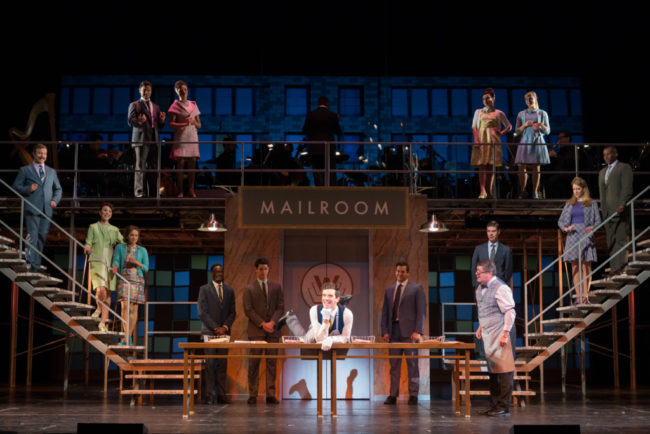
Lighting Designer Peter Kaczorowski has impeccable timing with the lighting cues used to drive home the humor of the piece. Every time Finch has “a moment” the sharp snap is perfection delivered in Kaczorowski’s design work. Unfortunately, the same cannot be said for Projection Designer Caite Hevner. While the potential for what’s attempting to be done with the projections is clear and actually clever, the execution is somewhat blurry and subpar compared to the other higher production values in the show. Hevner tries to articulate moving up and down through the office building, whenever they use the elevator, however between the construct of the set scaffolding, the elevator, and the overall bright and dimness of the projections on the back wall, this is generally not experienced as such.
Honing the aesthetic focus of the show into the libretto’s original setting, Costume Designer Amy Clark fits the dresses and the suits of the show to each individual performer divinely. Clark’s designs really shine in “Paris Original” with the slinky yet tastefully seductive red and black dress being custom tailored to each of the secretaries as they enter the company party. While some of the ensemble dresses are more eye-popping and catchy than others, the overall approach to Clark’s work is well suited for the production as a whole.
While there is a great deal to be said in praise of the production values and talent present in the show, especially considering that it’s meant to be part of a staged concert series, the bigger point of contention with this particular production is its attempt to neutralize the sexist and gender-biased humor around which the script was based. In making this attempt there are blunders that actually make the sexism worse. Taking out “Cinderella, Darling” and replacing it with “How to Succeed (Reprise)” may dampen the notion that women are gold-diggers who have nothing better to do than bag a rich business man, but the reprise paints females in no better a light, with the lyrics flapping on about making Rosemary an agenda-seeking nightmare who will take half of his assets and prime herself to be the victor in the pending divorce. Both seem inappropriate for the overall neutralization that was attempted for this production, and the aforementioned reprise is so short in its duration that it’s almost wondered as to whether it is necessary at all.
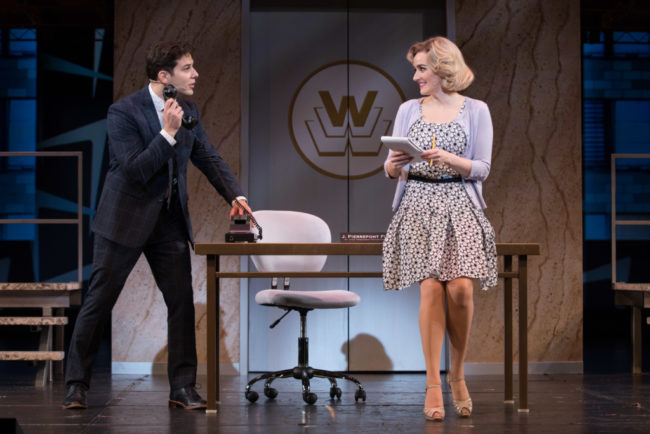
Despite the grandeur of the ‘period-esque’ costumes, it’s difficult to tell in which reality of time this production falls. Is it staying true to the 1960’s office life or is it a more modern office with bad 60’s style? Director Marc Bruni makes two clear distinctions between the types of characters in the show, with congenial individuals (of whom there are only Rosemary, Finch— who straddles the line but understandably so— and Smitty) and heightened animated caricatures of stereotypes (almost everybody else.) While this concept seems to draw attention to all of the “tolerable bad behavior” that the show is structured around, particularly with the sexual harassment elements only ever being enacted by the caricatures, there is an individual among the cast who all but disrupts this concept entirely. Nova Y. Payton as Miss Jones (who is egregiously too young for the role) does not live up to the caricature expectations of the stereotyped-individuals nor does she fit into the realm of congeniality. With a modern cadence, patois, and overall out-of-place existence, (and regrettably, a very modern tattoo that shows clearly during the “Paris Original” number) Payton creates a strange fissure in Bruni’s approach to the show.
The show, though quite good, is not without other faults. At times some of the caricature performers— in particular Michael Urie’s Bud Frump— tend to go completely off ther rails, pandering to the audience for the joke. (And at times the audience roars right along with him, so it’s difficult to say if this is bad performing…if you’re getting the desired response from the audience…) Most of these instances are readily overlooked because the performers living out hyper-animated caricatures do so with gusto, the three individuals who play convivial characters do so in earnest, and everything sounds extraordinary. New orchestrations (by way of Danny Troob, David Siegel and Robert Ginzler) really pump up the tempo and overall verve of the production, giving it an edgier feel and beat. In addition to this new zesty edge, there are extended dance breaks in some of the numbers, like “Coffee Break” which really puts some of Choreographer Denis Jones’ punchier work on display.
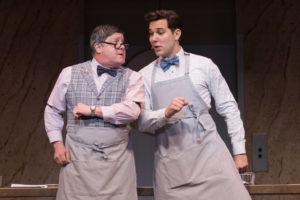
While some of the performances fall just shy of the mark, like the directorial restriction that Bruni places on Becki Newton’s Hedy LaRue, there are other performances that well exceed expectations. The ever-present Smitty (Joaquina Kalukango) is one such example. Kalukango fully embraces the period, from everything to her walk to the way she talks, and when she sings her way through “Been a Long Day” there is a sprightly simplicity that is naturally humorous, giving the number a flavor of authenticity up against the rest of the show’s heightened camp. Michael McGrath’s dual casting of Twimble and Wally Womper is equally spot on; both characters fall into the exasperated caricature concept that Bruni has layered over the production, but he does so with extraordinary vocal pipes for his half of “The Company Way” and a remarkably street savvy accent when playing Womper, Chairman of the Board.
Michael Urie’s Bud Frump is humorous, there is no denying that, even if at times it’s pushed a bit too far and completely gag-reel ready. Urie creates moments of extraneous character affectations that sometimes garner laughs and at other times are just awkward, but for the most part he conquers the overly ambitious caricature that’s been penned into the track of Bud Frump. There are moments during “The Company Way (Reprise)” where both Urie’s pitch and tempo are off, but this doesn’t seem to stop him (or the audience for that matter) enjoying the slapstick shenanigans that he puts into the number.
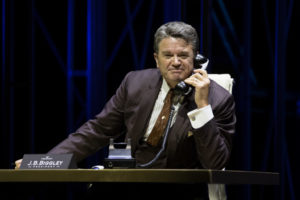
Proving without a doubt that one does not have to be of hulking physical proportions in any direction to accurately and impressively portray J.B. Biggley, John Michael Higgins gives the larger-than-life spirit expected of the World Wide Wickets Company boss. Higgins has exacting comic timing with his delivery and works through his scenes with great enthusiasm. He plays the jokes with straight truth, which ultimately creates a cleaner and more earnest sense of humor, and has an expressive voice that is perfect for singing “Old Ivy” and “Love From a Heart of Gold.”
The ingénue of the show, little Miss Rosemary Pilkington (Betsy Wolfe) is rather lively and not like what one might expect. Wolfe approaches the character from a down-to-earth position, which helps to ground the reality of her track and her interactions with Finch. Wolfe is sweet, of persona and of voice, when singing her “Happy to Keep His Dinner Warm.” Watch her facial expressions closely as well as her body language from the mid-point of the “Act I Finale” through to the end of that act, as she takes inferred emotional references to new heights in the story.
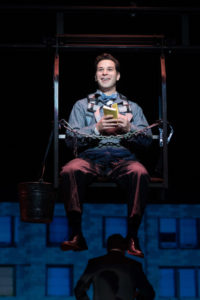
With powerhouse, lyrical vocals, Skylar Astin is a refreshing surprise in the role of J. Pierrepont Finch. Though his voice almost sounds more suited for some operatic ballad, the way he carries some of his solo numbers really allows for the radiance and brilliance of the score to be heard. Jovial and again in touch with the honest reality that only Finch, Rosemary, and Smitty seem to share, Astin’s character work is heartfelt and his emotional connection to his songs, especially “I Believe in You” feels strikingly authentic.
So take the great advice of Bebe Neuwirth— did we mention she’s the narrative voice of “The Book”?— and go to see How to Succeed in Business Without Really Trying…okay, neither Bebe Neuwirth or the book actually say that, but it’s great advice all the same! See it at The Kennedy Center this weekend only as the conclusion to the 2017/2018 Broadway Center Stage series.
Running Time: 2 hours and 40 minutes with one intermission
How to Succeed in Business Without Really Trying plays through June 10, 2018 as part of the Broadway Center Stage initiative at The Kennedy Center in The Eisenhower Theatre of The John F. Kennedy Center for the Performing Arts— 2700 F Street NW in Washington, DC. For tickets call the box office at (202) 467-4600 or purchase them online.

